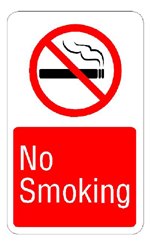
NO SMOKING
about smoking
news
smoking badness
smoking cessation
tobacco smoke & ASTHMA
product
about Passive (Involuntary) Smoking
what's
is it?
information
it's badness
how to protect your child from
passive smoking
say no to it
According to the U.S. Surgeon General, "Smoking cessation (stopping smoking) represents the single most important step that smokers can take to enhance the length and quality of their lives. In 1994, an estimated 69% of current smokers reported that they wanted to quit smoking. About 46% of current smokers made attempts to quit, however only 2.5% succeed. Why is quitting and staying quit so hard? Nicotine, the drug found in tobacco is highly addictive. It is as addictive as heroine and cocaine. It provides a pleasurable feeling that makes smokers want to smoke more. Smokers become physically and psychologically dependent on nicotine and must overcome this dependency to be successful in quitting permanently.
Nicotine Withdrawl
Withdrawal symptoms occur within a few hours after the last cigarette
and peak around 48 to 72 hours later. They can last from several days
to several weeks. Withdrawal symptoms can include depression, irritability
and restlessness, difficulty sleeping, trouble concentrating, headaches,
tiredness, increased appetite, and feelings of frustration and anger.
It's never too late to stop smoking
Several attempts to quit are usually required before one succeeds in quitting permanently. Older smokers are actually more likely to succeed at quitting smoking, particularly if they're already experiencing smoking-related symptoms like shortness of breath, coughing, or chest pain. Older smokers who want to quit are often motivated because of health problems. Once they quit, older smokers are also more likely than younger smokers to relapse into smoking.
Many older adults think it's too late to quit because they have smoked all their lives. But it is never to late to quit--there are definite benefits to quitting smoking at any age.

